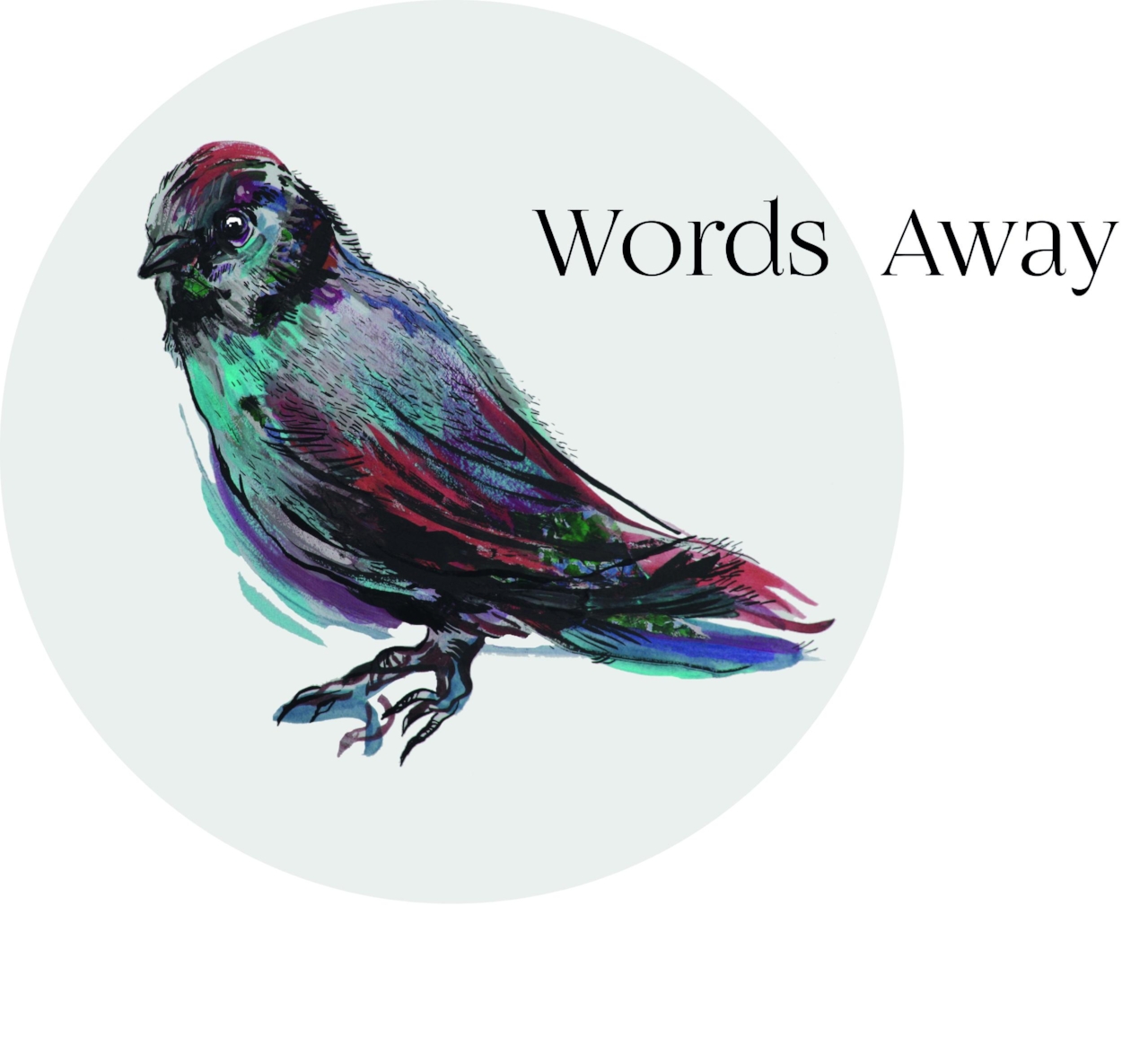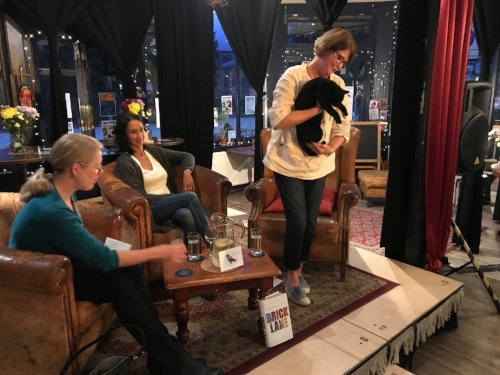Words Away has been up and running for a year now and so I was delighted to begin our new autumn season on Monday night with a sell-out salon: Imagining and Developing Characters with guest writer, Monica Ali. Feeling a little nervous beforehand, I’d walked through Vauxhall Gardens to the venue. Inside the Tea House, the room bustled with folk grabbing a bite or a cuppa and staking out a prime position for the evening. Monica arrived and it was good to see her, followed by Emma, fresh from teaching at the Festival of Writing, in York.
Emma Darwin. Monica Ali & Kellie Jackson
With everybody settled, except for Maggie the cat, who needed to be excavated from my chair and relocated to a welcoming lap, we embarked on what was an excellent discussion, a masterclass in fact. I’ve paraphrased the highlights here.
Let sleeping cats lie, unless they're sitting in your seat.
What comes first, a character or story or both? For Monica, the process begins with a character plus a situation. We’re hard wired for narrative; if we understand character first, then a plot will emerge. For depth and complexity of character, no other art form beats the novel.
How to know if you have a good character? In Monica’s case, instinct! And if you need a bit more than that, here’s her suggestions for building character:
1. Ensure your character has a strong defined dramatic need or desire. What is the driving force at work in the character? Be clear. It can be something simple. Chekhov understood this, “Tell me what you want and I’ll tell you who you are.” Character comes alive for the reader when they glimpse the deep desires at work in a character. Build a sense of motivation and leave room for the mysterious and irrational. Also leave room for the reader.
2. Ask what is the lens through which the character views their world?
3. Think about their attitude or a manner of being in the world - the two can overlap. There’s an inherent tension between point of view and attitude. Think of Evelyn Waugh’s, Brideshead Revisited, and the character of Sebastian Flyte who held a deeply pessimistic point of view but behaved with a hedonistic attitude.
4. Develop the process of change or transformation in your character or the potential for it. Detectives don’t change in series fiction (generally speaking) but in “literary” fiction, change is satisfying.
Monica starts writing once she has a handle on her characters. She doesn't make copious notes or use index cars - she lives with her characters, has conversations with them, hears their voices and dreams them into being. One way to discover your character’s interior life is to write a detailed biography. Put the work in. It’s the exception rather than the rule that great characters are created on the fly! Plan the ending of your novel or a sense of the ending and you will have a higher chance of finishing. Don’t rely on the muse! Don’t be afraid to change the ending but having a destination will help you get there.
Monica writes sequentially and polishes as she goes along. When it comes to revision, she looks at how she can pull back from the narrative. Where in the draft can she let a character be or do? Instead of an explanation or a line of dialogue, can she characterise by showing an action? Henry James illustrates this with, "What is character but the determination of incident. And what is incident but the illumination of character?” Drama is character in action. Look for the distinctive and unusual detail. Dickens was a master of this. Avoid unnecessary detail; you can capture character in a single line; “The priest was young and blushed easily” - Hemingway.
I loved the idea that Monica is, “…always writing about myself and someone else simultaneously”. Her characters might be a composite of real people, imagination or inspired by newspaper clippings and underpinned by research. It’s vital to feel something for her characters in order to care about what she’s writing.
Everbody settling in earlier in the evening.
For those starting out, Monica's key advice is to read widely. It’s the best training. Learn to read like a writer. Some of her favourite authors include Elizabeth Jane Howard, Penelope Fitzgerald, V.S Naipaul, Tolstoy, Jane Austin and the short stories of Chekhov.
Suggestions for beginners:
Avoid creating an average-joe protagonist - they might be easy to get along with in real life but in fiction they’re just dull, i.e. our job in fiction is to create conflict - even if it’s just strong internal conflict.
Seek out ways to master your craft. You don’t need to do an MA but learn about aspects of technique.
When writing an ‘awful’ character, riddled with flaws, look for a redeeming quality. Understand why they are that way.
Structural tips:
- Ask what's the least memorable scene in the narrative and weeding it out. Ask what is the most memorable scene, and perhaps move it around to serve the narrative. Keep asking these questions with every edit. Also ask where do your pauses come?
- Read your writing out loud. Listen for the cadences at work in the language.
- If the writing’s going stale, put it away for awhile and come back to it with fresh eyes.
- End each writing day at a point where you are eager to pick it up again the next day.
It was an illuminating evening and a brilliant way to begin our second year. With huge thanks to Monica Ali for being such a generous guest. Thank you to Emma too! I’ve included some relevant links below for further reference.
We’ll be back at the Teahouse Theatre Cafe on 16th October for Writing Fiction Using Real Characters with Jill Dawson - if you're thinking of coming, do try an book online to secure a place. Hope to see you there!
Kellie
PS, If you fancy some fun and inspiration - check out this Words Away workshop in a new collaboration with Andrew Wille: Everyday Magic: The Four Elements of Creativity, on Saturday, 18th November, at London Bridge Hive.
References & Links:
Anton Chekov: Selected Stories
Evelyn Waugh: Brideshead Revisited
Ernest Hemingway: A Farewell To Arms
Henry James: The Art of Fiction
Emma Darwin’s blog: This Itch of Writing
PSYCHIC DISTANCE: what it is and how to use it : also called narrative distance; an extraordinarily useful way of thinking, which is responsible for more lightbulb moments in my students than everything else put together.
SHOWING AND TELLING: the basics : how to use both to make your story do everything you want it to do.
CHARACTERISATION-IN-ACTION : how to develop your characters-in-action and make sure their journey is really compelling.
A big thank you to Yvonne Wilcox, who stepped in at the last moment to help guard the cakes and man the door.




